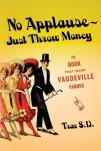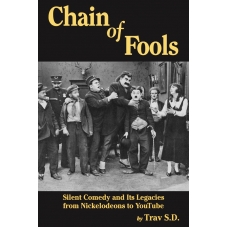Today is the birthday of Universal Studios founder and chief Carl Laemmle (1867-1939). Unlike William Fox, Marcus Loew, Jesse Lasky, the Schenk Brothers and others, Laemmle did not start out with a foot in vaudeville, but his enterprises played a major role in at least two of our other major content streams, silent comedy and Gothic horror, so he rates this shout-out here today.
Originally a dry goods clerk, Laemmle was contemplating buying his own store in Chicago, when he changed his mind and bought a nickelodeon instead. This turned into a string of nickelodeons, and then a desire to produce his own movies, which he first did through the Independent Moving Pictures Company (IMP) in 1909, which involved a certain amount of conflict with Edison’s Trust. IMP was the first company to promote the actual names of its stars, making Florence Lawrence and King Baggot the first movie actors whose identities were widely known to the public.
In 1912 he formed Universal Pictures with a variety of important partners, including David Horsley of Nestor (one of the earliest of the film companies), Kessel and Bauman (the backers of Mack Sennett’s Keystone), and others (Laemmle was eventually to buy them all out).
Universal operated a wide variety of discrete brands and studios-with-the-studio, many of which operated in the comedy line to give competition to Keystone. Universal attracted talent from other studios to bolster their bull pen. Alkali Ike was recruited from Essanay and rebranded Universal Ike. Ford Sterling and Henry Lehrman were plundered from Keystone. Lehrman was to launch his own L-KO shop at Universal; among the talent lured there were directors George Nichols and Harry Edwards and performers Alice Howell, Hank Mann, and Billie Ritchie. In 1913, Laemmle launched his Joker brand especially to produce comedies. Among its stars were Louise Fazenda and Harry McCoy. Nestor also remained one of Universal’s product lines for a time, and this is where Al Christie (later to start his own comedy studio) got his start.
Under Laemmle’s leadership (and the enthusiastic advocacy of his son, Carl Jr. Universal also became an early leader in the horror field, with the two early Lon Chaney classics The Hunchback of Notre Dame (1923) and The Phantom of the Opera (1925), the pseudo-horror The Man Who Laughs (1928) with Conrad Veidt and the Frankenstein, Dracula, Mummy, Wolfman and Invisible Man franchises, plus later entries like The Creature from the Black Lagoon.
The studio obviously still flourishes today, but Laemmle passed away in 1939, so we end our brief observance here.
For more on early film history don’t miss my new book Chain of Fools: Silent Comedy and Its Legacies from Nickelodeons to Youtube, just released by Bear Manor Media, also available from amazon.com etc etc etc
To find out more about the vaudeville, consult No Applause, Just Throw Money: The Book That Made Vaudeville Famous, available at Amazon, Barnes and Noble, and wherever nutty books are sold.




One must not forget Carl Laemmle’s other innovation, he brought about film exchanges which made it easy for producers to get their products to cinemas for easy viewing.
LikeLike
Indeed!
LikeLike